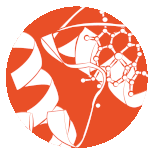Posted at 13 May 2015 14:08h
in
Talk Science to Me news
by Amanda

The Talk Science to Me team is a dedicated collection of science communications professionals. Unfortunately, we rarely see each other, since most of us work remotely. Our weekly internal newsletter has become a great way to stay in touch, and we often share tips for staying productive and getting the most out of a workday.
So, supplementing our recent post on
resolutions for writers, here are some of the team's recommendations for getting it done (whatever
it is).
Warming up to work
Deb starts the day by checking her schedule on her smart phone while running up 1,000 stairs, stopping to stretch after every 100.
Roma prefers the slightly more sedentary approach of looking over her diary while drinking a cup of strong coffee.
Not sure if this works, but
Amanda suggests watching the strangely hypnotic
Dancing Jellies video to get into work mode at the beginning of the day.



 The Talk Science to Me team is a dedicated collection of science communications professionals. Unfortunately, we rarely see each other, since most of us work remotely. Our weekly internal newsletter has become a great way to stay in touch, and we often share tips for staying productive and getting the most out of a workday.
So, supplementing our recent post on
The Talk Science to Me team is a dedicated collection of science communications professionals. Unfortunately, we rarely see each other, since most of us work remotely. Our weekly internal newsletter has become a great way to stay in touch, and we often share tips for staying productive and getting the most out of a workday.
So, supplementing our recent post on 

 On Thursday, May 14, the Segal Centre at the Simon Fraser University (SFU) Vancouver Campus will host the
On Thursday, May 14, the Segal Centre at the Simon Fraser University (SFU) Vancouver Campus will host the